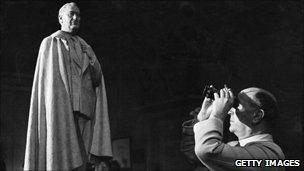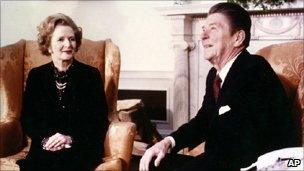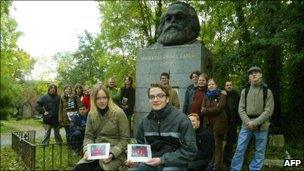Why London is getting a statue of Ronald Reagan
- Published
- comments
Reagan statue unveiled in London
A statue of US President Ronald Reagan has been unveiled near the US embassy in London, to mark the centenary of his birth. How did this come about?
Once upon a time, 4 July in London was the occasion for a grand party at the American ambassador's vast residence in Regent's Park.
The diplomatic corps, leading MPs, titans of industry, and we sparrows of the press would feast on hamburgers, hot dogs and crumbs of gossip on the vast back lawn.
But this is the Age of Austerity. The party is now a scaled-down event for the creme de la creme. This year, the big 4 July event in London was held in Grosvenor Square just across from the American embassy and it was a private affair not hosted by the US government. A statue of Ronald Reagan, 40th president of the United States, was unveiled.
Baroness Thatcher, Reagan's soul-mate in power, was invited but was unable to attend. However, 2,000 other paying guests did and listened to remarks by British Foreign Secretary William Hague, former US Secretary of State Condoleezza Rice, and the current ambassador, Louis Susman.
The creation of the statue - total cost $1m - did not grow out of a public clamour for a fitting memorial to the late president (though Westminster City Council made an exception to its usual rule refusing permission for statues until 10 years have passed since the subject's death).
The event is part of a year-long series of big occasions to mark the centenary of Reagan's birth, organised by the Ronald Reagan Presidential Foundation. In the weeks prior to the London unveiling, statues have been unveiled and conferences convened in Krakow, Budapest and Prague.
Cold Warrior
John Heubusch, executive director of the foundation, says the events are part of fulfilling the mission "to preserve and promote the president's legacy".
Now, there is a long tradition of private groups honouring their heroes with public memorials.

The statue of FDR in Grosvenor Square was funded by public subscription
Across from the Reagan statue is a presidential predecessor, Dwight Eisenhower. It shows Eisenhower in his general's uniform - his headquarters during the months preparing for D-Day overlook Grosvenor Square - and it was given by the people of Kansas City, Missouri. Eisenhower was from just over the state line in Kansas.
At the other end of the political spectrum, there is the massive bust of Karl Marx in Highgate Cemetery, erected in 1954 by the Communist Party of Great Britain.
Inevitably, the effort to "preserve and promote" Reagan's legacy comes with a big injection of political spin. A quotation attributed to Lady Thatcher, "Ronald Reagan won the Cold War without firing a shot," is etched on to the Reagan statue's plinth.
Actually, there were plenty of shots fired during the Reagan presidency. It's just they were fired by proxies out of earshot of Washington and London and so are easy to forget.
Shared enemies
The epitaph glosses over the pair's good fortune in arriving in power just as the rot inherent in the Soviet system had fatally weakened the whole structure of the society. It also helped that the USSR was bogged down in an unwinnable war (with US proxies) in Afghanistan.

Margaret Thatcher made friends with Gorbachev - and Reagan met him five times
And it altogether fails to acknowledge the courage of ordinary men and women in the Eastern Bloc who created mass movements out of thin air that ultimately led to the revolutions of 1989.
You don't have to be an acolyte, though, to appreciate how remarkable a conjunction in Anglo-American history the Reagan-Thatcher era represented, how much they achieved, and how much their world views continue to shape politics on both sides of the Atlantic a quarter of a century after they left office.
They came to power at approximately the same time and set about facing down the same perceived foreign and domestic enemies. Abroad it was Soviet Communism. At home it was the unions and the welfare state.
On the domestic front, both succeeded in reining in the unions but ultimately failed in the larger goal. The welfare state in America and Britain remains in place and politicians tamper with it at their peril - as Prime Minister David Cameron and the Republican Congress are finding out.
Implacable
But in dealing with the Soviet Union the pair worked like a well-oiled team.

Weird artefact: Plenty of tourists make the trek to Marx's grave in Highgate
It was Thatcher who first noted that Mikhail Gorbachev was a man with whom the West could do business. Her certification of the Soviet leader's bona fides led to face-to-face meetings between Reagan and Gorbachev five times - an unprecedented figure between American and Soviet leaders - and genuine negotiations on Strategic Arms Limitation and human rights.
At the same time, for their domestic audiences, Reagan and Thatcher maintained a stance of implacable anti-Communism.
There are enough grey areas in the historical record - not to mention events hidden behind official secrecy rules - to keep historians arguing for centuries about how precisely the Cold War was won.
The Soviet Union is thankfully dead, but people still make the trek to Highgate Cemetery, slightly north of the usual tourist path, to look at Marx's enormous glowering head. It is a weird artefact of a different time in history.
Grosvenor Square will also find itself off the beaten track in 2017 when the American Embassy relocates south of the river Thames. The Reagan statue will remain. Will people make a special trip to view it?
It seems likely that, in the matter of posthumous memorials, Reagan and Marxism will be going head to head for decades yet.
Michael Goldfarb, external is a former London bureau chief for National Public Radio, and the author of Emancipation: How Liberating Europe's Jews from the Ghetto Led to Revolution and Renaissance.
- Published4 July 2011
- Published30 March 2011
- Published17 January 2011
- Published29 December 2010